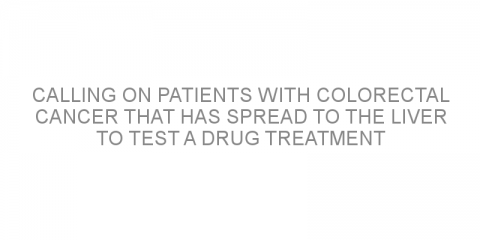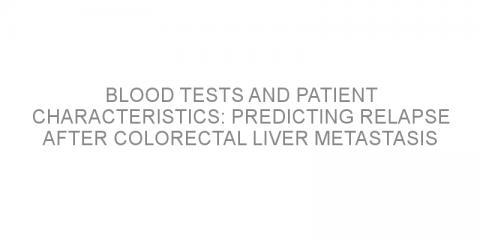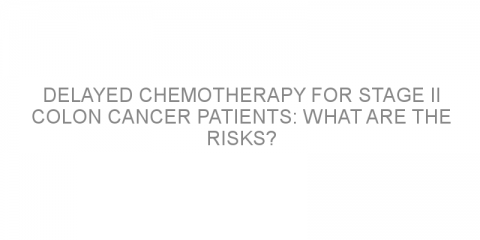“I also know that the sooner I die, the more money my family will have.” ~from the post Why Advocate? by Lori Marx-Rubiner On hearing the word “cancer” from your physician, your first thoughts are naturally on treatment. In fact, your focus should be on treatment. Unfortunately and sometimes tragically, in the US finances need to be a top...
Read MoreColorectal cancer Posts on Medivizor
Calling on patients with colorectal cancer that has spread to the liver to test a drug treatment option
In a nutshell This study is being carried out in New York and New Jersey. It will examine whether adding panitumumab (Vectibix) to chemotherapy reduces the risk of the cancer returning in colorectal cancer patients with liver metastases (cancer that has spread to the liver). The authors will also record any adverse events experienced and patient...
Read MoreComparison of two drug combinations for treating colorectal cancer that has spread
In a nutshell The authors compared two drug combinations for the treatment of metastatic colorectal cancer. Some background Metastatic colorectal cancer indicates the cancer has spread from the colon or rectum to other parts of the body. Treatment often includes a combination of chemotherapy drugs such as FOLFOX...
Read MoreTreating rectal cancer that has spread to the liver: liver or rectum first?
In a nutshell This study assessed the outcome of a reverse treatment strategy for rectal cancer patients with cancer that has spread to the liver (liver metastases). Some background The best treatment approach for patients with rectal cancer that has spread to the liver is not clear. In some cases the rectal cancer is treated first, followed...
Read MoreBlood tests and patient characteristics: predicting relapse after colorectal liver metastasis
In a nutshell This study examined whether blood markers or patient characteristics can predict if cancer will relapse in patients with colorectal cancer that has spread to the liver (colorectal liver metastases). Some background Carcinoembryonic antigen (CEA) is a protein found in the blood of colorectal cancer patients. Because it is not normally...
Read MoreDoes lymph node size matter after chemoradiotherapy for rectal cancer?
In a nutshell This study evaluated whether lymph node size is useful for predicting lymph node invasion in rectal cancer patients. Some background Locally advanced rectal cancer indicates that the cancer has spread beyond the lining of the rectum or has spread to the nearby lymph nodes. Patients with locally advanced rectal cancer are often...
Read MoreAge matters: long-term symptoms in colorectal cancer survivors
In a nutshell This study investigated the long-term well-being of colon and rectal cancer survivors. Some background Over the last decades there have been major advances in the screening for and treatment of colon and rectal cancer. As a result, the numbers of survivors of these cancers is increasing worldwide. To improve aftercare quality for...
Read MoreLymph node testing in rectal cancer patients: is 12 still the magic number?
In a nutshell This study examined whether removing 12 lymph nodes is still valid for correctly staging rectal cancer patients. Some background Assessing whether cancer has spread to the local lymph nodes is important for correctly staging rectal cancer and correctly treating the cancer after surgery. Current guidelines for staging rectal cancer...
Read MoreDelayed chemotherapy for stage II colon cancer patients: what are the risks?
In a nutshell This study investigated whether delayed chemotherapy treatment can affect stage II colon cancer patient survival. Some background Stage II colon cancer indicates that the cancer has invaded the outer layers of the colon, but it has not spread to the lymph nodes or to distant organs. Current treatment guidelines suggest that patients...
Read MoreComparison of two biologic drugs for treating metastatic colorectal cancer
In a nutshell This study compared two biologic drugs (drugs extracted from biological sources) for treating metastatic (spread to other areas of the body) colorectal cancer. Some background Metastatic colorectal cancer is often treated with combinations of chemotherapy drugs. One common combination is called FOLFIRI, and includes the agents...
Read MoreOver 70? Bevacizumab plus double chemotherapy treatment is safe and effective
In a nutshell This study examined the efficacy and safety of a combination of three drugs for treating elderly patients with metastatic colorectal cancer (cancer that has spread from the colon or rectum to distant sites). Some background The combination of chemotherapy drugs capecitabine (Xeloda) and oxaliplatin (Eloxatin; XELOX) is safe and...
Read MoreIs intensity-modulated radiotherapy plus capecitabine safe and effective for treating locally advanced rectal cancer?
In a nutshell This study assessed the safety and efficacy of intensity-modulated radiotherapy plus capecitabine (Xeloda) before rectal surgery. Some background Locally advanced rectal cancer indicates that the cancer has spread beyond the lining of the rectum or has spread to the nearby lymph nodes. Patients with locally advanced rectal cancer are...
Read More












